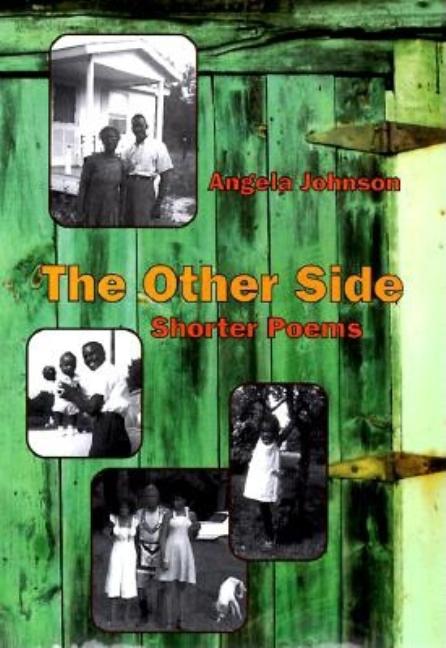Book Descriptions
for The Other Side by Angela Johnson
From Cooperative Children's Book Center (CCBC)
Shorter, Alabama, is the community of childhood and family for writer Angela Johnson. The place where she grew up, it is filled with memories that will soon be all that she has left of Shorter. Her Grandmama writes her, They're pullin' Shorter down." And so the subtitle of this collection is a play on words that echoes with poignancy as readers move through a series of poems that are quiet reflections of childhood feelings and events seen through the eyes of an adult returning to the place of her past with appreciation for what was and sadness for what never will be again. Written without sentimentality or nostalgia but rippling with emotions rooted in childhood that continue to resonate, these poems also provide detailed, sensual observations of life and people in a small, southern African American community during the late 1960s and early 1970s. The book is illustrated with black-and-white photographs from the author's personal collection. (Ages 11-15)
CCBC Choices 1998. © Cooperative Children's Book Center, Univ. of Wisconsin - Madison, 1998. Used with permission.
From the Publisher
Delineates Lacan's theory of the four discourses as a practical framework through which faculty can reflect on where their students are, developmentally, and where they might go.
University classrooms are increasingly in crisis—though popular demands for accountability grow more insistent, no one seems to know what our teaching should seek to achieve. This book traces how we arrived at our current impasse, and it uses Lacan's theory of the four discourses to chart a path forward via an analysis of the freshman writing class. How did we forfeit a meaningful set of goals for our teaching? T. R. Johnson suggests that, by the 1960s, the work of Bergson and Piaget had led us to see student growth as a journey into more and more abstract thought, a journey that will happen naturally if the teacher knows how to stay out of the way. Since the 1960s, we've come to see development, in turn, only as a vague initiation into the academic community. This book, however, offers an alternative tradition, one rooted in Vygotsky and the feminist movement, that defines the developing student writer in terms of a complex, intersubjective ecology, and then, through these precedents, proposes a fully psychoanalytic model of student development. To illustrate his practical use of the four discourses, Johnson draws on a wide array of concepts and a colorful set of examples, including Franz Kafka, Keith Richards, David Foster Wallace, Hannah Arendt, and many others.
"Graceful, provocative, thoughtful, and well researched, The Other Side of Pedagogy connects theory and teaching in compelling ways. This is a groundbreaking book that scholars of writing will want to read, reread, and teach." — Joseph Harris, author of A Teaching Subject: Composition Since 1966
University classrooms are increasingly in crisis—though popular demands for accountability grow more insistent, no one seems to know what our teaching should seek to achieve. This book traces how we arrived at our current impasse, and it uses Lacan's theory of the four discourses to chart a path forward via an analysis of the freshman writing class. How did we forfeit a meaningful set of goals for our teaching? T. R. Johnson suggests that, by the 1960s, the work of Bergson and Piaget had led us to see student growth as a journey into more and more abstract thought, a journey that will happen naturally if the teacher knows how to stay out of the way. Since the 1960s, we've come to see development, in turn, only as a vague initiation into the academic community. This book, however, offers an alternative tradition, one rooted in Vygotsky and the feminist movement, that defines the developing student writer in terms of a complex, intersubjective ecology, and then, through these precedents, proposes a fully psychoanalytic model of student development. To illustrate his practical use of the four discourses, Johnson draws on a wide array of concepts and a colorful set of examples, including Franz Kafka, Keith Richards, David Foster Wallace, Hannah Arendt, and many others.
"Graceful, provocative, thoughtful, and well researched, The Other Side of Pedagogy connects theory and teaching in compelling ways. This is a groundbreaking book that scholars of writing will want to read, reread, and teach." — Joseph Harris, author of A Teaching Subject: Composition Since 1966
Publisher description retrieved from Google Books.


